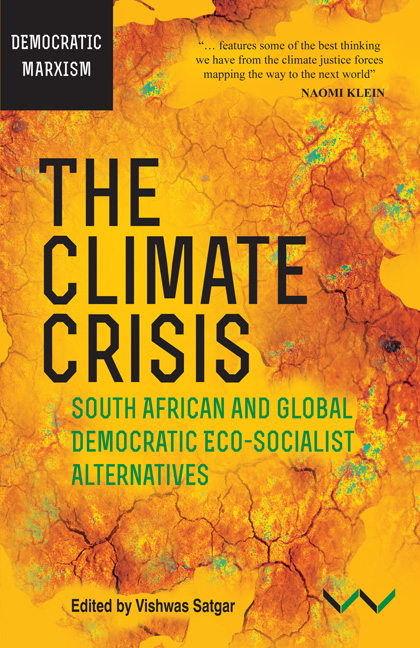Book contents
- Frontmatter
- Contents
- Tables and Box
- Acknowledgements
- Acronyms and Abbreviations
- Chapter 1 The Climate Crisis and Systemic Alternatives
- PART ONE THE CLIMATE CRISIS AS CAPITALIST CRISIS
- Chapter 2 The Limits of Capitalist Solutions to the Climate Crisis
- Chapter 3 The Anthropocene and Imperial Ecocide: Prospects for Just Transitions
- PART TWO DEMOCRATIC ECO-SOCIALIST ALTERNATIVES IN THE WORLD
- PART THREE DEMOCRATIC ECO-SOCIALIST ALTERNATIVES IN SOUTH AFRICA
- CONCLUSION
- Contributors
- Index
Chapter 2 - The Limits of Capitalist Solutions to the Climate Crisis
from PART ONE - THE CLIMATE CRISIS AS CAPITALIST CRISIS
Published online by Cambridge University Press: 05 June 2019
- Frontmatter
- Contents
- Tables and Box
- Acknowledgements
- Acronyms and Abbreviations
- Chapter 1 The Climate Crisis and Systemic Alternatives
- PART ONE THE CLIMATE CRISIS AS CAPITALIST CRISIS
- Chapter 2 The Limits of Capitalist Solutions to the Climate Crisis
- Chapter 3 The Anthropocene and Imperial Ecocide: Prospects for Just Transitions
- PART TWO DEMOCRATIC ECO-SOCIALIST ALTERNATIVES IN THE WORLD
- PART THREE DEMOCRATIC ECO-SOCIALIST ALTERNATIVES IN SOUTH AFRICA
- CONCLUSION
- Contributors
- Index
Summary
There is an increasing acceptance that capitalism is directly connected with climate change and that the apocalyptic consequences of it are already causing deaths, diseases, dislocations and destruction to ecology and people's lives, which will continue as there is no decisive measure being taken to address the climate crisis. Society's relationship with nature under extractivist capitalism follows the principles of ownership and rights of access, modes of production and consumption, the need for permanent added-value, as well as class and gender relations, all of which are associated with profit maximisation and exploitation of people and nature. It is important to emphasise that the privilege to profit, overconsume and overdiscard is reserved for a small portion of society.
The extraction of fossil fuels (oil, coal, natural gas), which is the biggest cause of climate change, enables large-scale production of goods, transportation systems and efficient distribution networks of products and services. Climate change is therefore not just an environmental issue; it is both a social and an ecological crisis. Even modern wars in the last three decades, as exemplified by the invasion of Iraq, were at least partially about access to and control of the production and distribution of oil. As the impacts of climate change intensify, free-market ideology, big business and financial actors increasingly shape the strategies and priorities in addressing it. At the same time, resistance to neoliberalism, efforts to reclaim the commons (land, water and forests, knowledge, etc.), struggles against ‘development aggression’ by states and corporations and the promotion of alternative models of development are being globalised.
The United Nations Framework Convention on Climate Change (UNFCCC), established in 1992, is the principal and only universal intergovernmental body to tackle climate change. Its annual high-profile Conference of the Parties (COP) is attended by 196 member states. Despite the inclusion of climate change in policies after the historic 1992 Earth Summit in Rio de Janeiro that gave birth to the UNFCCC, and after more than two decades of meetings, the total global anthropogenic greenhouse gas (GHG) emissions, which cause climate change, have continued to increase.
The scientific literature is clear – an overwhelming majority of climate scientists, over ninety-seven per cent, acknowledge that humans are the primary cause of climate change (Romm 2016).
- Type
- Chapter
- Information
- Climate Crisis, TheSouth African and Global Democratic Eco-Socialist Alternatives, pp. 30 - 46Publisher: Wits University PressPrint publication year: 2018



